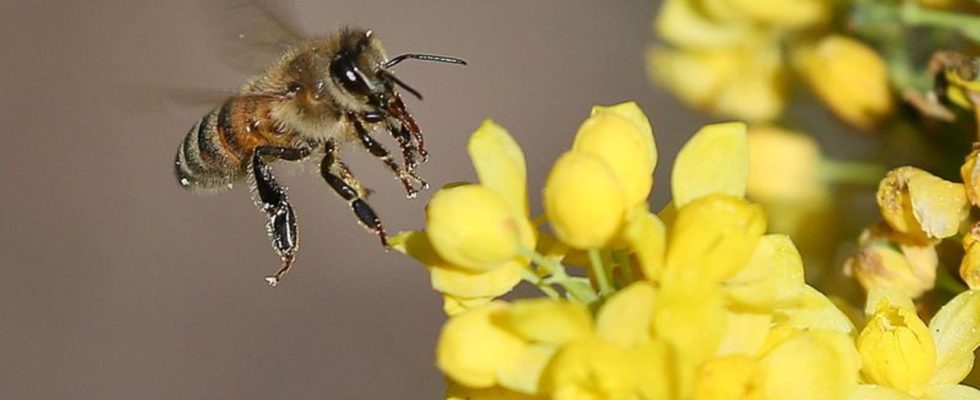environmental Protection
After insecticide off: researchers call for more bee protection
According to studies, neonicotinoids cause significant damage to wild and honey bees. photo
© Wolfgang Kumm/dpa
For insect protection, the EU has severely restricted the use of neonicotinoids on fields and fields. However, bee researchers are not perfectly happy. Farmers, on the other hand, complain about crop losses.
Ten years after the EU-wide partial ban on three bee-harming insecticides, experts are calling for more efforts to make agriculture more environmentally friendly.
“There is a list of urgent requests,” said Berlin neurobiologist and bee researcher Randolf Menzel of the German Press Agency. In principle, every insecticide should only be used in the event of an acute pest infestation – and not as a preventive measure, for example by dressing the seeds, demanded the professor emeritus at the Freie Universität Berlin.
Many synthetic pesticides not only destroy unwanted insects or pathogens in the field, but also useful or at least harmless organisms. Neonicotinoids are synthetically manufactured insecticides which, according to the Federal Environment Agency (Uba), disrupt the transmission of nerve stimuli. They were therefore widely used, among other things, as seed dressings to protect them from infestation with harmful insects, but can also be spread in soil as granules.
Insecticides may no longer be used on fields
On April 29, 2013, the EU states cleared the way for a partial ban on the neonicotinoids clothianidin, imidacloprid and thiamethoxam. The requirements were tightened again in 2018. Since then, these insecticides can only be used in greenhouses, if at all, but no longer on fields. According to studies, these neonicotinoids cause significant damage to wild and honey bees.
If damage does occur, the use of such agents should only be permitted after strict controls, Menzel demanded. According to analyses, neonicotinoids can impair the ability of bees to learn and orient themselves and even paralyze and kill the animals that are important for pollination. The molecules are also taken up by flowers and pollen and thus spread in the environment.
Significant increase in infestation pressure from harmful insects
The Secretary General of the German Farmers’ Association, Bernhard Krüsken, explained that the ban on the three active ingredients had increased the pressure of infection and infestation by harmful insects significantly. This affects, for example, sugar beets and rapeseed, he said. “Here there are significant yield losses on the infested fields.” The pests that were once fought with it include corn rootworm and pollen beetle.
The increasingly mild winters also improved the conditions for insects that transmit a harmful virus, explained Krüsken. So the problem will tend to get worse. “Any active ingredient that is no longer available leaves a gap and must be replaced,” he warned. “The gaps are getting bigger due to the ever more extensive approval procedures.”
Half of insecticides are neonicotinoids
As the neurobiologist Menzel explained, new neonicotinoids are still being developed in Germany or have already been brought onto the market. These were only fatal in higher doses than their predecessors. However, they could also have a very damaging effect at lower doses – for example on brood development, navigation or learning ability. “These are important properties for pollinating insects,” emphasized Menzel.
In his estimation, around half of the insecticides used are neonicotinoids. The neurobiologist demanded that these agents should be banned as completely as possible because of their property of spreading in the environment and causing extreme damage.
In principle, many chemicals for crop protection in agriculture, such as insecticides or weed killers, are too cheap, the expert warned. With monocultures, it is often more economical for the farms to drive the spray cannon across the field – instead of digging up the field to protect against pest infestation or to keep a crop rotation.
In the fight against the use of insecticides in agriculture, Menzel believes that consumers have the greatest decision-making power. “We have to be prepared to spend more money on food to a greater extent.” Picking on farmers doesn’t solve the problem. “The consumer must also buy the more expensive organic product from the farmers.”

